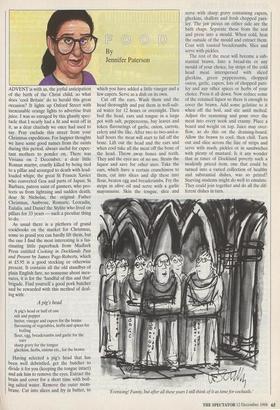(0)
o
By Jennifer Paterson
ADVENT is with us, the joyful anticipation of the birth of the Christ child, so what does 'cool Britain' do to herald this great occasion? It lights up Oxford Street with inexcusable orange lights to advertise fruit juice. I was so enraged by this ghastly spec- tacle that I nearly had a fit and went off in it, as a dear charlady we once had used to say. Pray exclude this street from your Christmas expeditions. For happier thoughts we have some good names from the saints during this period, always useful for expec- tant mothers to ponder on. There was Viviana on 2 December, a dear little Roman martyr, cruelly killed by being tied to a pillar and scourged to death with lead- loaded whips; the great St Francis Xavier who converted Goa and parts of Japan; St Barbara, patron saint of gunners, who pro- tects us from lightning and sudden death; dear St Nicholas, the original Father Christmas, Ambrose, Romaric, Leocadia, Eulalia, and Daniel the Stylite who lived on pillars for 33 years — such a peculiar thing to do.
As usual there is a plethora of grand cookbooks on the market for Christmas, some so grand you can hardly lift them, but the one I find the most interesting is a fas- cinating little paperback from Mudlark Press entitled Cooking in Docklands Past and Present by James Page-Roberts, which at £5.95 is a good stocking or otherwise present. It contains all the old standbys of plain English fare, no nonsense about mea- sures, it is for the 'handful of this and that' brigade. Find yourself a good pork butcher and be rewarded with this method of deal- ing with:
A pies head
A pig's head or half of one
salt and pepper butter, vinegar and capers for the brains flavouring of vegetables, herbs and spices for boiling flour, egg, breadcrumbs and garlic for the ears sharp gravy for the tongue gherkins, herbs, onions etc., for the brawn
Having selected a pig's head that has been well debristled, get the butcher to divide it for you (keeping the tongue intact) and ask him to remove the eyes. Extract the brain and cover for a short time with boil- mg salted water. Remove the outer mem- brane. Cut into slices and fry in butter, to which you have added a little vinegar and a few capers. Serve as a dish on its own.
Cut off the ears. Wash them and the head thoroughly and put them in well-salt- ed water for 12 hours or overnight. Then boil the head, ears and tongue in a large pot with salt, peppercorns, bay leaves and token flavourings of garlic, onion, carrots, celery and the like. After two to two-and-a- half hours the meat will start to fall off the bone. Lift out the head and the ears and when cool take all the meat off the bone of the head. Throw away bones and teeth. They and the eyes are of no use. Strain the liquor and save for other uses. Take the ears, which have a certain crunchiness to them, cut into slices and dip these into flour, beaten egg and breadcrumbs. Fry the strips in olive oil and serve with a garlic mayonnaise. Skin the tongue, slice and serve with sharp gravy containing capers, gherkins, shallots and fresh chopped pars- ley. The jaw pieces on either side are the bath chaps. Separate these from the rest and press into a mould. When cold, heat the outside of the mould and extract them. Coat with toasted breadcrumbs. Slice and serve with pickles.
The rest of the meat will become a sub- stantial brawn. Into a bread-tin or any mould of your choice, lay strips of the cold head meat interspersed with sliced gherkins, green peppercorns, chopped onion, garlic, capers, lots of chopped pars- ley and any other spices or herbs of your choice. Press it all down. Now reduce some of the retained liquor so there is enough to cover the brawn. Add some gelatine to it when off the boil, and stir until melted. Adjust the seasoning and pour over the meat into every nook and cranny. Place a board and weight on top. Juice may over- flow, so do this on the draining-board. Allow the brawn to cool, then chill. Turn out and slice across the line of strips and serve with mash, pickles or in sandwiches with plenty of mustard. Is it any wonder that in times of Dockland poverty such a modestly priced item, one that could be turned into a varied collection of healthy and substantial dishes, was so prized? Starving students might do well to emulate. They could join together and do all the dif- ferent dishes in turn.
`Evensong! Funny, but after all these years I still think of it as time for cocktails.'










































































 Previous page
Previous page